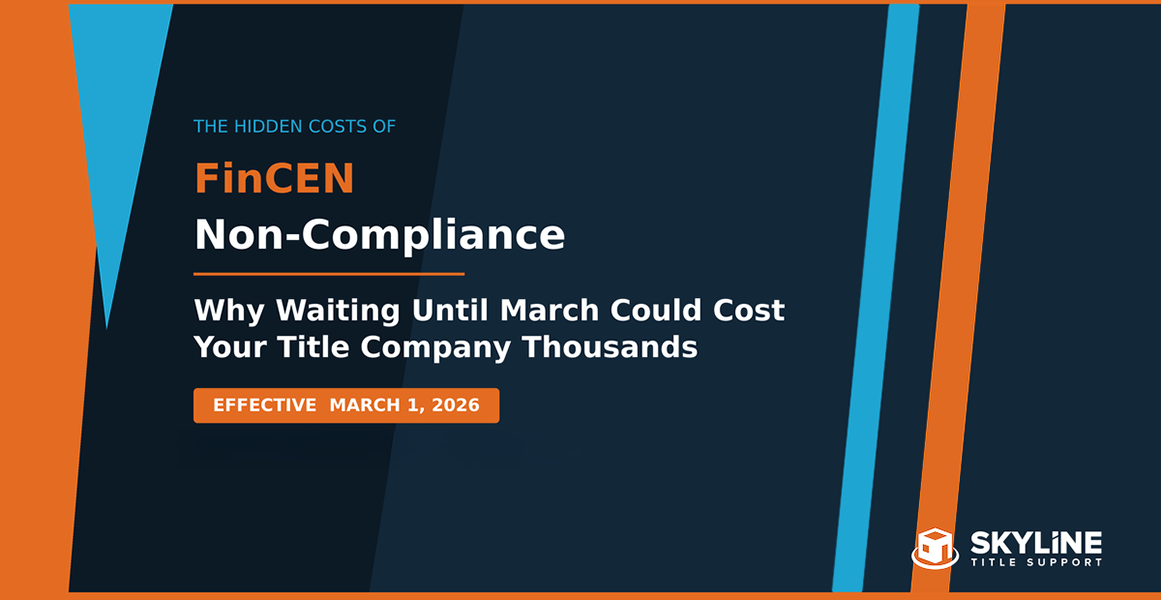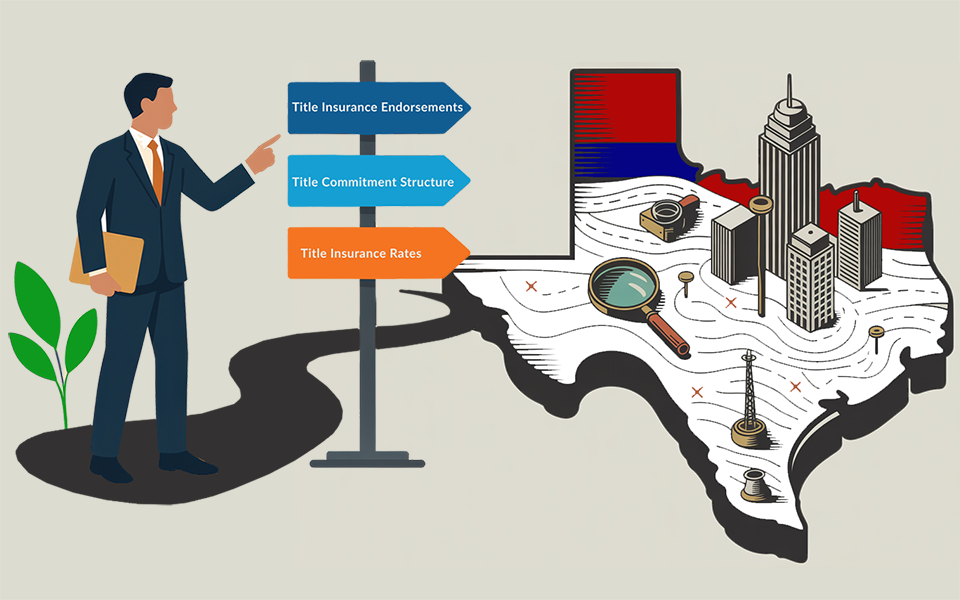FinCEN Compliance Reporting Services — Be Ready Before March 1, 2026 Learn More →
December 22, 2025
Zoning Letters and Everything You Need to Know About Them

What is a Zoning Verification Letter?
A Zoning Verification Letter is an essential document that a property owner or developer may need to request from the local municipality or county planning department. This letter will confirm whether the subject property is in full compliance with the zoning ordinance and outline any outstanding zoning restrictions that may affect the site. For those involved in commercial real estate, understanding the zoning district is crucial, as it dictates what types of buildings or construction can take place on a particular parcel.
To obtain a zoning verification letter, applicants typically need to provide specific information about the property and may need to reference the city or county website for additional resources. The alternative to the DIY method of obtaining a Zoning Letter is to use a professional title support company like Skyline. The letter will not verify whether a building can be constructed; rather, it serves to confirm compliance with existing zoning regulations. It is a key component in the due diligence process for any office or development project.
The Importance of the Zoning Letter for Property Owners and Why You Need One
The importance of the zoning letter for property owners cannot be overstated. This formal document serves as a critical tool in real estate transactions, providing essential information about the particular property in question. Property owners need to know the zoning regulations that apply, as these can vary significantly depending on the local government policies. To obtain this document, clients typically need to request one letter from the city secretary’s office, which will provide a zoning verification letter on official letterhead.
Additionally, the letter will include a description of the zoning classification, relevant maps, and any existing conditional use permits that may be associated with the property. In some cases, property owners may require rezoning if they plan to develop the land differently than what is currently permitted. Therefore, it's advisable to partner with a knowledgeable real estate professional to navigate the complexities of zoning regulations. For any inquiries or to approve the process, please contact your local zoning office, as they can assist with the necessary service. An invoice may be issued for this service, outlining any applicable fees.
A zoning verification letter is essential for anyone looking to buy, sell, or develop property. This document provides official confirmation of the current zoning classification of a specific parcel of land, ensuring that the proposed use aligns with local regulations. Without it, you may face unforeseen obstacles that could delay or derail your project. For instance, if the intended use of the property is opposite to what is permitted under the existing zoning, you might encounter legal issues or be required to apply for a zoning change, which can be a lengthy process.
In Florida, where land use regulations can be complex, a zoning verification letter acts as a safeguard against potential pitfalls. It helps identify any restrictions or requirements that apply to the property, allowing you to make informed decisions. By obtaining this letter, you can avoid investing time and resources into a project that may not comply with local zoning codes. In essence, it serves as an important tool in navigating the often-intricate landscape of real estate development and property transactions in Florida.

How Does a Zoning Verification Letter Differ from Other Zoning Documents?
A zoning verification letter serves a distinct purpose when compared to other municipal zoning documents. Unlike more comprehensive documents that may require extensive analysis or elaborate approval processes, a zoning verification letter is typically a straightforward confirmation of a property's current zoning status. It is often requested to provide information about the specific zoning designations and any applicable requirements for a property. This makes it an essential tool for real estate transactions or development proposals.
Moreover, while other zoning documents may include a detailed copy of zoning ordinances or regulations, a zoning verification letter is generally concise and focused. In many cases, these letters can be accessed online, streamlining the process for property owners and developers. This is in direct contrast to more complex documents, which might require a formal request or in-person visit to municipal offices. Thus, the zoning verification letter acts as a quick reference, providing clarity when needed, while other documents can be more comprehensive and time-consuming to obtain.
Common Reasons Property Owners Request a Zoning Letter
Property owners often request a zoning letter for various reasons, primarily to gain clarity on the zoning regulations that apply to their property. One common reason is to confirm the zoning classification of their land, which dictates what types of activities or developments are permissible. This is crucial for owners considering renovations, expansions, or new constructions, as they need to ensure compliance with local laws.
Another frequent motive is to support financing or insurance applications. Lenders and insurers typically require proof that a property adheres to local zoning laws, making a zoning letter an essential document during these processes. Additionally, property owners may seek a zoning letter to resolve disputes or clarify any ambiguities regarding the use of their property, especially in cases where land use regulations are in question.
Lastly, individuals interested in purchasing a property often request a zoning letter to understand the potential for future development or investment opportunities. By obtaining this information, they can make informed decisions that align with their long-term goals and interests.
How a Zoning Verification Letter Affects Commercial Development
A Zoning Verification Letter plays a crucial role in the commercial development process by providing clarity and assurance regarding the zoning status of a property. This letter confirms whether a specific use of the land complies with local zoning regulations. For developers, obtaining this verification is essential as it outlines permitted uses, restrictions, and any potential variances required to move forward with their projects. Without a Zoning Verification Letter, developers may face unexpected obstacles, including legal challenges or the need for costly redesigns, which can significantly delay timelines and increase project costs.
Furthermore, a Zoning Verification Letter can enhance the attractiveness of a property to investors and stakeholders by providing a clear understanding of zoning compliance. It serves as a valuable due diligence tool, allowing developers to assess risks and make informed decisions about their investments. Ultimately, the presence of a Zoning Verification Letter not only facilitates smoother project approvals but also contributes to a more predictable development environment, fostering economic growth and community development.
Legal Implications of Not Obtaining a Zoning Verification Letter
The legal implications of not obtaining a zoning verification letter can be significant for property owners and developers. This document serves as an official confirmation that a specific property complies with local zoning laws, which dictate how land can be used. Without this verification, individuals may inadvertently engage in activities that violate zoning regulations, leading to potential legal disputes with local authorities. Such violations can result in fines, mandatory cessation of operations, or even legal action to enforce compliance. Additionally, failure to obtain a zoning verification letter can jeopardize future property transactions, as buyers may be wary of purchasing a property that lacks proper zoning documentation. This uncertainty can also affect property values and marketability. Furthermore, in some jurisdictions, financial institutions may require proof of zoning compliance before approving loans for property development. Therefore, securing a zoning verification letter is not merely a bureaucratic step; it is a critical safeguard against legal and financial repercussions that could arise from zoning non-compliance.
How to Obtain a Zoning Verification Letter?
There are two ways to obtain a Zoning Verification Letter. One way is to use a professional online service such as the one Skyline offers for Zoning Letters. Or you can go through the process yourself. If you decide to obtain the letter yourself, you'll need to identify the local zoning authority in your area, typically the city or county planning department. Visit their website or office to gather the necessary information and forms required for the application process. It's important to have the property's fl number, which is a unique identifier for the parcel, as it will expedite your request.
Once you have the forms filled out, submit them along with any required fees and supporting documentation, such as a site plan or previous zoning letters. The zoning authority will then review your request to ensure compliance with local regulations. Be prepared for possible follow-up questions or additional documentation requests.
After the review process, you should receive your Zoning Verification Letter, which will detail the zoning classification, allowable uses, and any restrictions or conditions that apply to the property. This letter is crucial for any future development or investment decisions.
Documents Required to Apply for a Zoning Letter
Applying for a zoning letter requires a specific set of documents to ensure compliance with local regulations. The primary document needed is a completed application form, which typically requests basic information about the property, including its address and current zoning designation. Additionally, applicants must provide a copy of the property deed or a recent title report that demonstrates ownership and outlines any existing easements or restrictions.
Another crucial document is a site plan, which should illustrate the property's boundaries, existing structures, and any proposed developments. This helps zoning officials assess the intended use of the land and its compatibility with surrounding areas. Furthermore, applicants may need to include proof of identification, such as a driver's license or passport, to verify their identity and authority to make the application.
Finally, it's often advisable to include any supporting documentation, such as photographs of the site or past zoning approvals, to strengthen the application. Ensuring all these documents are complete and accurate can expedite the review process and increase the chances of a successful outcome.
How to Interpret the Information in the Zoning Letter
Interpreting the information in a zoning letter can seem daunting at first but breaking it down into manageable parts can help clarify its meaning. First, pay attention to the zoning classification, which outlines the specific type of use permitted on the property, such as residential, commercial, or industrial. Understanding this classification is crucial to determine what activities can legally occur on the site.
Next, look for any conditional uses or restrictions that may apply. These stipulations can limit how the property can be developed or used, so it’s essential to review them thoroughly. Additionally, check for any setback requirements, which dictate how far structures must be from property lines, as these can significantly impact design and layout.
Finally, examine any variances granted or requested, as they indicate exceptions to standard zoning rules. This information can provide insight into the flexibility of zoning regulations for your particular property. By taking the time to analyze these components, you can gain a comprehensive understanding of what the zoning letter entails and how it affects your plans.
What a Zoning Verification Letter Will Not Verify
When requesting a Zoning Verification Letter, it's important to understand its limitations. As previously mentioned, this letter primarily confirms the current zoning classification of a property and whether the intended use aligns with local zoning regulations. However, it does not verify the legality of existing structures or improvements on the property. If there are any non-conforming uses or illegal buildings, these issues will not be addressed in the letter.
Additionally, a Zoning Verification Letter will not provide information on building permits or code compliance. While it may confirm that a property is zoned for a particular use, it does not guarantee that all necessary permits have been obtained or that the property adheres to safety and construction codes. Furthermore, the letter does not assess potential future zoning changes, which could affect the property’s use. It simply reflects the current status as of the time the letter is issued.
In summary, while a Zoning Verification Letter is a useful document for understanding zoning designations, it should not be relied upon for comprehensive property assessments or legal assurances.
How Zoning Laws Impact Commercial Properties
Zoning laws play a crucial role in determining how commercial properties can be used and developed within a given area. These regulations dictate the types of businesses that can operate in specific zones, which can directly influence the economic vitality of a community. For instance, a zone designated for retail may limit the establishment of industrial facilities, thereby fostering a consumer-friendly environment. Conversely, areas zoned for manufacturing may attract businesses that contribute to job creation and economic growth.
Additionally, zoning laws can impact property values significantly. When a commercial property is located in an area with favorable zoning regulations, it can lead to higher demand and, consequently, increased property values. However, if the zoning laws restrict the types of businesses that can operate, property values may stagnate or decline. Furthermore, changes in these laws can create ripple effects, influencing investment decisions and the overall development landscape of a region.
Understanding zoning laws is essential for investors, developers, and business owners as they navigate the complexities of commercial real estate. Compliance with these regulations ensures that businesses can thrive while also contributing to the community's growth and development.

What Happens if Your Property is Not in Compliance?
If your property is not in compliance with local regulations, it can lead to a series of serious consequences. Initially, you may receive a formal notice from the municipality or relevant authority, outlining the specific violations and requiring you to rectify them within a designated timeframe. Failure to address these issues can result in substantial fines or penalties, which can accumulate over time, increasing your financial burden.
In addition to financial repercussions, non-compliance can also affect your property’s value. Prospective buyers often shy away from properties with outstanding violations, fearing future liabilities or additional costs. This can lead to a stagnant real estate market for your property, making it challenging to sell or refinance.
Moreover, ongoing non-compliance may result in more severe actions, such as legal action or even the potential for eviction if you are a tenant. In extreme cases, authorities might issue an order to demolish structures that pose safety hazards. Therefore, maintaining compliance is crucial for safeguarding your investment and ensuring peace of mind.
Non-compliance can also impact your insurance coverage. Many insurance providers require properties to adhere to certain standards, and failing to comply may result in denied claims or increased premiums. Thus, it is crucial to address compliance issues promptly to avoid these potential repercussions.
How to Request a Variance for Your Property
Requesting a variance for your property involves a structured process that varies by location. First, familiarize yourself with your local zoning laws and regulations to understand the specific requirements for a variance. Typically, you'll need to demonstrate that your situation is unique and that the strict application of the zoning ordinance would cause undue hardship. Gather supporting documents, including surveys, site plans, and photographs of your property, which can help illustrate your case.
Next, prepare a formal application for the variance, clearly outlining the reasons for your request. This application will often require a fee, so check with your local zoning office for the exact amount. Once submitted, your application will be reviewed by the relevant zoning board or commission. Most jurisdictions will require a public hearing where you can present your case and answer any questions from board members and community members.
Finally, be prepared for potential opposition from neighbors or community members. Addressing their concerns can be crucial for the success of your variance request. Following the hearing, the zoning board will make a decision, which you can appeal if necessary.
Common Errors to Avoid When Requesting a Zoning Letter
When requesting a zoning letter, avoiding common errors is crucial to ensure a smooth process. One frequent mistake is not providing adequate property details. Be sure to include the exact address, parcel number, and any relevant zoning designations. This information helps zoning officials quickly locate the property and understand its context.
Another common error is submitting an incomplete or vague request form. It's essential to be clear about the purpose of the request and what specific information you need from the zoning letter. Ambiguities can lead to delays or miscommunications, so take the time to articulate your needs precisely.
Additionally, many people fail to check for any required documentation that must accompany the request. This can include site plans, surveys, or previous zoning approvals. Missing these documents can result in your request being returned or delayed.
Lastly, not following up on your request can lead to unnecessary waiting. Keeping in touch with the zoning office can help you stay informed about the status of your zoning letter and address any potential issues promptly.
Resources for Verifying Zoning Compliance
Verifying zoning compliance is an essential step for property owners, developers, and real estate professionals. Several resources can assist in this process. First, local government websites often provide access to zoning maps and ordinances, which outline the specific zoning categories and regulations applicable to a particular area. By reviewing these documents, individuals can determine whether their intended use aligns with local zoning laws.
Additionally, contacting the local planning department can yield valuable insights. These departments can offer guidance regarding the zoning classification of a property and inform applicants about any necessary permits or approvals. Furthermore, professional services such as land use attorneys and urban planners can provide expertise in navigating complex zoning regulations and compliance issues.
Another helpful resource is community meetings or forums, where residents can engage with local officials and discuss zoning matters. Networking with fellow property owners can also provide anecdotal insights into the compliance process. Utilizing these resources ensures that stakeholders can avoid potential legal issues and contribute to community planning effectively.
Related Posts
How to Read a Title Commitment: 12 Exceptions That Scare Buyers (But Don’t Always Kill the Deal)
If you have ever opened a title commitment and felt your stomach drop when you hit the exceptions, you are not alone. Buyers often see a long ....
January 31, 2026
2026 Title Industry Outlook: Top 10 Trends That Will Redefine Due Diligence and Closings
The title industry is heading into 2026 with more moving parts than at any time in recent memory: rapid regulatory change, deeper fraud risk ...
December 22, 2025
Witchy Titles & Cursed Closings: What Salem’s History Can Teach Us About Real Estate Due Diligence
In 1692, the town of Salem, Massachusetts descended into chaos. Fueled by fear, rumors, and suspicion, dozens of people were accused of witchcraft and ...
December 22, 2025
Real Estate Due Diligence Checklist: 9 Hidden Costs That Kill Closings
Imagine this: A $3.2 million Miami Beach home sale implodes because of a $127 unpaid utility lien that no one caught in time. Absurd as it sounds ...
December 22, 2025
How Can Large Title Companies Thrive in Volatile Times?
When mortgage rates climbed to 23-year highs in late 2023, one national title insurer watched transaction volume plummet 45% over eight weeks yet ...
December 22, 2025
The Title Pro's AI Companion: Using Skyline's SmartTitle Assistant
How much time did you spend drafting repetitive client emails today? Our average title professional saves 5+ hours weekly using SmartTitle Assistant™ ...
December 22, 2025
Title Industry 2.0: Harnessing AI, Data, and Cybersecurity for a Resilient Future
The title industry is at a crossroads. Traditional methods that have served us well for decades now face mounting challenges in an increasingly ...
December 22, 2025
How Title Services Impact Mortgage Underwriting Timelines
In the world of real estate, the journey from application to closing is filled with numerous moving parts. Among these, title services are a crucial yet ...
December 22, 2025
How Title Companies Can Meet Tight Deadlines Without Sacrificing Quality
In today's fast-paced real estate environment, speed is crucial. Title companies often find themselves in high-pressure situations where they must juggle ...
December 22, 2025
5 New Year's Resolutions for Title Companies in 2025
As 2025 kicks off, the title industry is moving faster than ever. With new technologies, shifting customer needs, and more complex regulations, there’s ...
December 22, 2025
The Hidden Complexities of Property Title Searches
You've found your dream home. The price is right, the location is perfect, and you're ready to sign on the dotted line. But before you do ...
December 22, 2025
What’s Next for the Title Industry? Key Trends for 2025
The title industry is at a pivotal moment, with 2025 shaping up to be a year of significant transformation. From groundbreaking technologies like blockchain ...
December 22, 2025
Navigating the Cyber Minefield: A Title Professional's Complete Guide to Phishing Defense
The title industry is a prime target for cybercriminals, and phishing is one of the most common threats that title professionals face today. Imagine this ...
December 22, 2025
Recent Posts
























.png)


